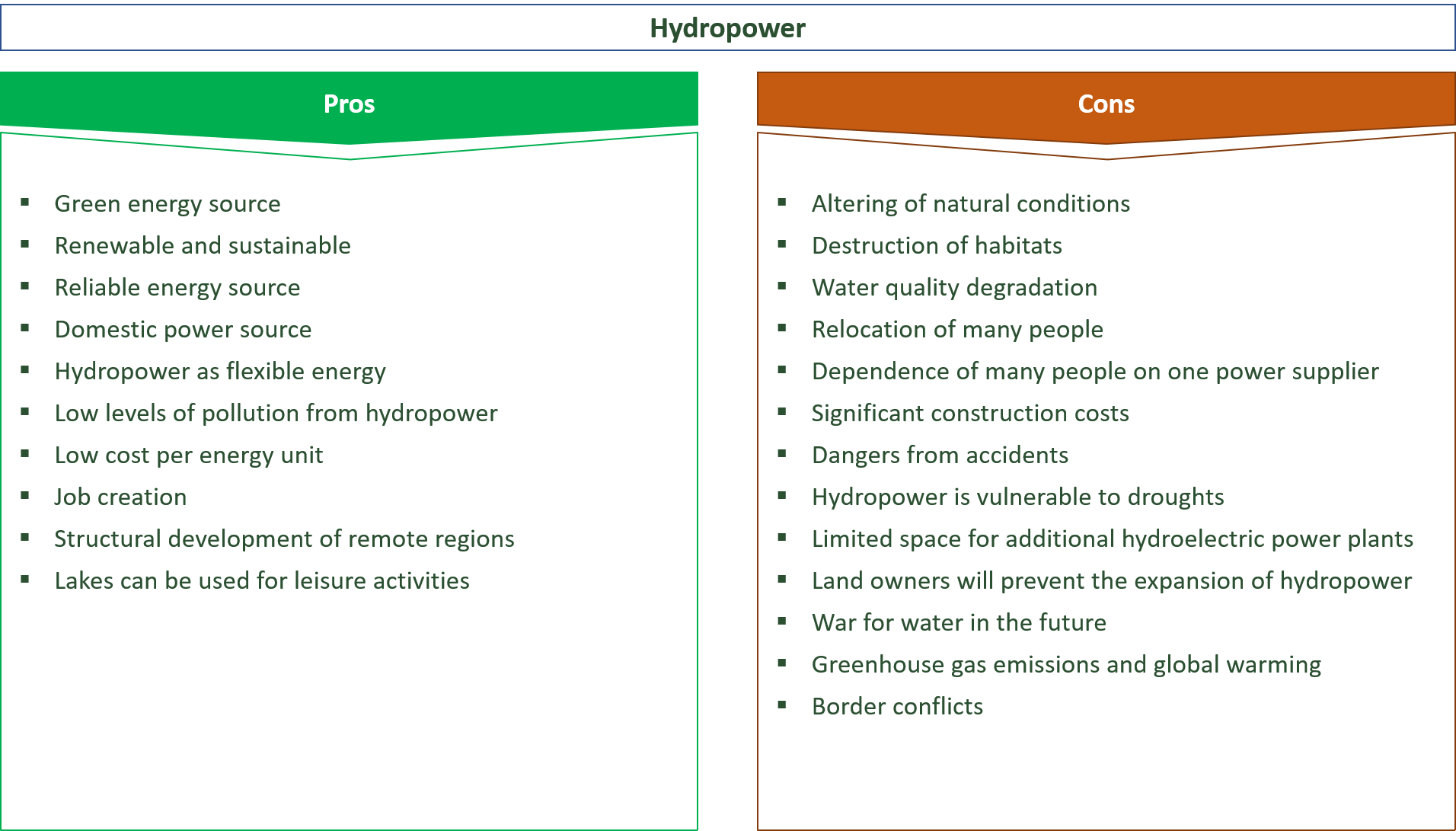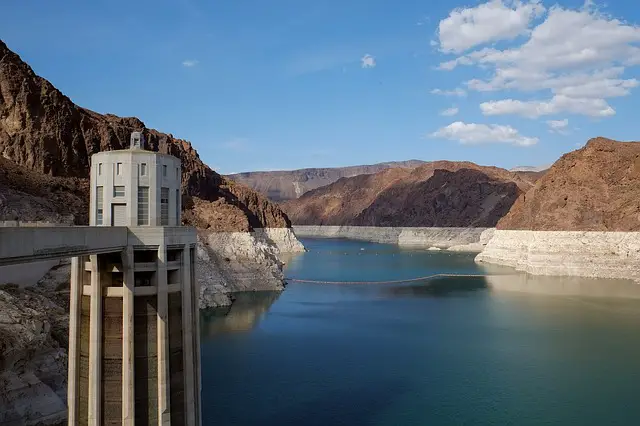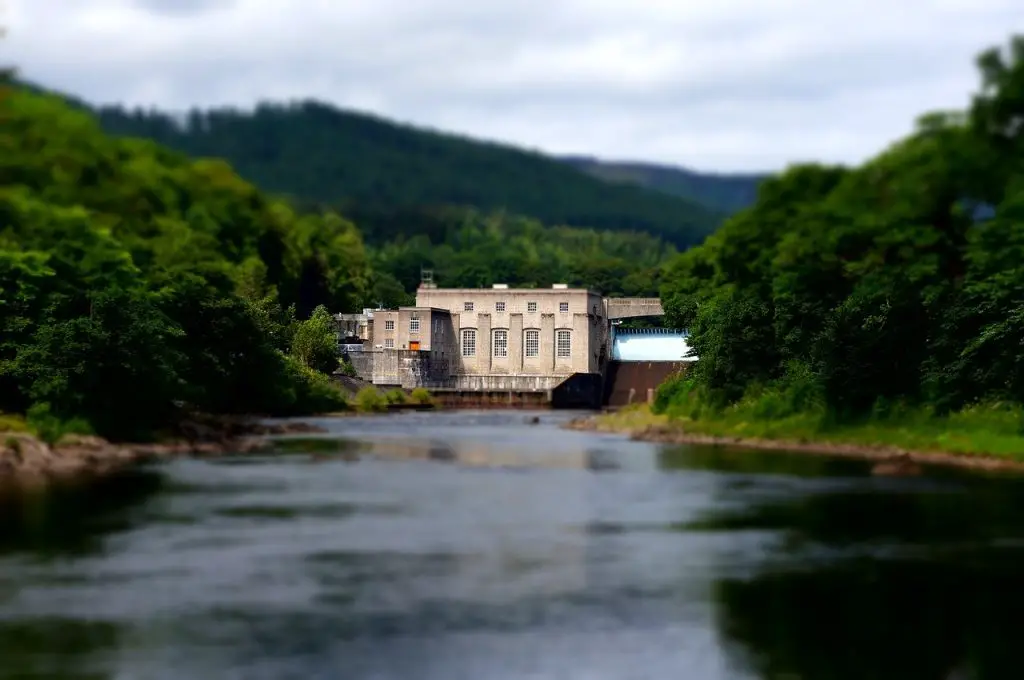“Hydropower is a clean and renewable energy source that provides affordable power throughout the country.”
Seth Moulton, Politician
Advantages & Disadvantages of Hydropower

Hydroelectric power is energy that is produced through the use of fast-running water like rivers or streams.
The mechanical power of the water is used to move a turbine and to produce large amounts of electricity in turn.
Even though hydropower has plenty of advantages and can be regarded as promising technology in the transition process from fossil to renewable energies, it also has serious downsides.
In this article, the pros and cons of hydropower are examined in detail.
Audio Lesson
Contents
Advantages of Hydropower
- Green energy source
- Renewable and sustainable
- Reliable energy source
- Domestic power source
- Hydropower as flexible energy
- Low levels of pollution from hydropower
- Low cost per energy unit
- Job creation
- Structural development of remote regions
- Lakes can be used for leisure activities
Green energy source
Hydroelectric energy can be considered to be a green power source since it is quite eco-friendly and only causes quite low levels of pollution.
Contrary to other conventional energy sources, it does not rely on fossil fuels for energy production.
Thus, water energy is a green energy that may play an important role in our future energy mix.
Renewable and sustainable
Water is an element that exists long before the first human populated the planet and will also be there when humanity becomes extinct.
Therefore, it can be regarded as a renewable and sustainable energy source.
Even though water will become a quite scarce resource in the future due to global warming, especially in the Southern hemisphere, for many regions on our planet, it will still be a sustainable power source if the infrastructure around this kind of energy will be sophisticated enough to meet the challenges related to global warming.
Reliable energy source
Water energy can also be considered to be a quite reliable power source.
Since dams are usually used to control the water supply, even in dry periods of the year, there should still be enough water available to generate sufficient electricity in the majority of countries on our planet.
Thus, by using hydro energy as primary power source, the local population can be quite sure that their energy demand can be met in a reliable manner.
Domestic power source
In contrast to power production with fossil fuels, the production of hydropower does not require mining or the shipping of fuels over quite long distances.
For instance, for energy production with coal, the coal has to be mined out of our ground.
After that, it has to be transported over quite long distances to the power plant, where it can be converted into power.
However, this process implies the destruction of habitats for a variety of animals and plants and also implies the emission of large amounts of greenhouse gases due to the long transportation distances.
By using hydropower, all those downsides mentioned before can be avoided, since there is no mining in the hydropower production involved and the water will be converted into energy right where the power plant had been installed.
Hydropower as flexible energy
Hydropower can also be regarded as quite flexible energy source.
Due to the help of dams, the amount of energy that is produced each day can be controlled quite well.
For instance, in times of droughts, the energy production may be lowered to increase the water level of the reservoir in order to ensure the production of enough electricity in the future.
In times of heavy rainfalls, more water can be used for energy production.
Thus, through the use of dams, hydropower can be a quite flexible and controllable power source.
Low levels of pollution from hydropower
The generation of electricity through hydropower also implies only low levels of pollution.
For instance, power plants that use conventional fossil fuels like coal or gas often emit plenty of harmful gases into our atmosphere.
Contrary to those fossil power sources, water power production only small quantities of harmful gases.
Thus, hydropower can be regarded as more sophisticated than conventional power sources regarding the emission of harmful gases into our atmosphere.
Low cost per energy unit
Compared to other renewable energies, the production of energy with hydropower is rather cheap.
Even though the initial construction of hydropower plants and dams is often quite costly, once it has been installed, the unit price of hydropower energy is quite low.
Hence, hydropower may be more cost-efficient compared to other green energy sources like wind power.
Job creation
Especially in regions where there is a high level of unemployment, the construction of hydropower plants may be a chance to create jobs and to improve the overall living conditions of the local population.
With a lower unemployment rate, the average income of the local population increases, which in turn increases consumption levels and tax revenue.
In turn, municipalities could spend more money on infrastructure, which would further improve the quality of life for locals.
Structural development of remote regions
Also in quite remote regions where people often solely rely on self-containment and there are no jobs at all, the construction of hydropower plants in those regions might greatly benefit the local population since locals may be able to earn more money and to provide their children with better education.
Moreover, landowners might be willing to sell their land to power production companies for a quite good price.
Lakes can be used for leisure activities
The construction of hydropower facilities also implies the building of a dam.
Through this dam, large reservoirs will be formed.
These reservoirs could be used by the local population as a place where those people can relax and spend their leisure.
Thus, hydroenergy might not only produce large amounts of electricity, it may also provide the local population with additional recreational areas.

Disadvantages of Hydropower
- Altering of natural conditions
- Destruction of habitats
- Water quality degradation
- Relocation of many people
- Dependence of many people on one power supplier
- Significant construction costs
- Dangers from accidents
- Hydropower is vulnerable to droughts
- Limited space for additional hydroelectric power plants
- Landowners will prevent the expansion of hydropower
- War for water in the future
- Greenhouse gas emissions and global warming
- Border conflicts
Altering of natural conditions
Even though water energy has some important advantages, it also has a variety of downsides.
One of the cons of hydropower is that it alters the natural conditions in the respective ecosystem.
For instance, water flows are disrupted or changed in a different direction or manner.
Areas that previously have been covered by water may dry up and areas that have previously been dry may be covered with water.
In turn, many animals and plant species may be confused due to these changes in natural living conditions, which may lead to a decrease of those species and may also lead to an imbalance in local ecosystems.
Destruction of habitats
Through the building of dams, habitats of many animal and plant species may be destroyed.
Many animals now have to relocate to other areas of land.
Moreover, fishes may not be able to get downstream anymore due to the dam that is blocking their way and may not be able to mate, which in turn may lead to a serious decline of some fish species.
Water quality degradation
The water quality may also significantly suffer from the construction of hydropower plants.
Since the water is stowed in reservoirs, algae are more likely to develop and grow and the oxygen levels in the water may drop.
In turn, since fishes rely on stable oxygen levels, these water animals may decrease in population since they simply will not have enough oxygen available to survive in the long run.
Moreover, people who use these reservoirs to take a bath and to relax in their leisure time may also contribute to water pollution, since they may dispose of remains and trash into the water, which will further decrease water quality of these reservoirs.
Relocation of many people
Due to the construction of dams and changes in natural water flows, many people have to be relocated in the construction process of hydropower plants.
Those people usually lose their home and are forced to move to other areas.
In turn, if those people are not compensated in a fair manner, many of those people may end up in poverty since they often lose their livelihood due to the relocation process.
This is especially true for farmers whose sole income came from crop yields and who have to leave their fields due to the construction of dams related to hydropower.
Dependence of many people on one power supplier
Even though water power can be considered as a quite reliable power source, there may also be power outages from time to time.
This may be due to natural disasters or also technical issues.
If whole cities solely rely on hydropower for their energy supply, in case of power outages, these people will not be supplied with energy at all.
Thus, solely relying on hydroelectricity seems not to be a good idea.
Better would be to use hydropower in conjunction with other green energy sources so that in case one energy source has outages, other energy sources could back up the energy supply for the local population.
Significant construction costs
Although the unit price of energy related to hydropower is rather low, the initial construction costs for dams and hydropower plants are quite high.
The construction of those dams can take many years and billions of dollars.
Thus, municipalities have to pay huge upfront costs for the construction and installation of dams.
Moreover, also repairs and the overall monitoring may be costly as well.
Therefore, hydropower is not that cheap when we take a look at the whole hydropower value chain and not only at the unit price of produced energy.
Dangers from accidents
In the history of mankind, there had been some accidents related to hydropower.
In the worst case, dams break and large amounts of water flood nearby valleys, which in turn often leads to the death of many people.
Although those kinds of extreme accidents are quite rare, there is still a small probability left for those catastrophes and water power could potentially kill thousands of people who live nearby those dams and reservoirs.
Hydropower is vulnerable to droughts
Droughts are a big issue, especially in the Southern hemisphere of our planet.
The problem of droughts may become even worse in the future due to global warming.
Thus, in areas where droughts are quite common, hydropower may no longer be a suitable power source since without sufficient water, water turbines are not able to provide sufficient energy for the local population.
Therefore, especially in regions where droughts are a big issue, alternative energy sources like solar power should be used instead.
Limited space for additional hydroelectric power plants
For the efficient production of hydroelectricity, large rivers or streams are needed to provide enough water.
However, many of those locations where hydropower energy production would be possible are already used for power production.
Thus, it may be hard to find many additional spots to construct additional hydropower plants.
Therefore, the expansion of hydropower may be harder than for other energy sources due to the limited locations that may be suitable for hydroelectric energy production.
Landowners will prevent the expansion of hydropower
Many landowners may also not be willing to sell their land to hydropower companies since they fear losing their home and their livelihood.
This will make the expansion of hydropower even more difficult.
In the worst case where landowners will be expropriated, it may take several years to finish this process.
Thus, the expansion of hydropower may be slowed down by the protests of landowners who are not willing to provide their land for this kind of technology.
War for water in the future
Water is a quite precious resource, even though we often do not think of it that way since water, especially in our Western world, is quite cheap.
However, water is vital for all life on our planet.
In the future, water will become a quite scarce resource due to global warming, especially in the Southern hemisphere of our planet.
Droughts may destroy the livelihood of millions of people and may also prevent the expansion of water energy in those regions since there may not be enough water left for hydropower plants.
Moreover, people may literally fight over water in the future and may even conduct wars against hydropower companies who may prevent the local population to get sufficient water.
Greenhouse gas emissions and global warming
Contrary to popular beliefs, hydropower is not entirely eco-friendly, since it also implies the emission of greenhouse gases into our atmosphere.
Even though the amount of greenhouse gases that are emitted due to hydropower is much lower compared to conventional energy sources, it still poses problems in the context of global warming.
Thus, there may be other green power sources that are better for our planet in terms of greenhouse gases than hydroelectricity.
Border conflicts
Rivers often represent the border between two countries.
In those cases, when it comes to decisions regarding the construction of hydropower plants, both countries have to agree that this construction is in line with the goals of both countries.
However, if one country wants to build a hydropower plant and the other country does not, there may be serious conflicts between those countries which may even result in wars in the worst case.

Top 10 Hydropower Pros & Cons – Summary List
| Hydropower Pros | Hydroelectricity Cons |
|---|---|
| Green energy | Altering of natural conditions |
| Renewable & sustainable | Habitat destruction |
| Reliable power source | Degradation of water quality |
| Domestic energy source | Relocation of people |
| Flexible energy | Dependence on one power source |
| Low pollution levels | High construction costs |
| Cost per energy unit quite low | Accidents |
| Local job creation | Limited space for expansion |
| Reservoirs can be used for leisure activities | Greenhouse gas emissions |
| Development of remote regions | Border conflicts |
Conclusion
Hydropower is a promising energy source that currently supplies millions of people with electricity.
Hydroelectricity may continue to play an important role in our future energy mix.
Even though it has many advantages, water power also has severe downsides.
Thus, it should be decided on an individual basis if the construction of hydropower plants is a valid option, depending on geographic and social factors of the respective region.
Sources
https://en.wikipedia.org/wiki/Hydropower
https://www.eia.gov/energyexplained/hydropower/
https://www.irena.org/hydropower
https://www.energy.gov/eere/water/types-hydropower-plants

About the author
My name is Andreas and my mission is to educate people of all ages about our environmental problems and how everyone can make a contribution to mitigate these issues.
As I went to university and got my Master’s degree in Economics, I did plenty of research in the field of Development Economics.
After finishing university, I traveled around the world. From this time on, I wanted to make a contribution to ensure a livable future for the next generations in every part of our beautiful planet.
Wanna make a contribution to save our environment? Share it!